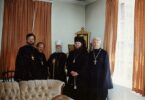Influenced by the prevailing feeling of the need to attain peace in the Church the Bishops’ Council of 1934 decided to lift the suspensions imposed upon Metropolitan Evlogy and his vicar bishops in 1927.
The following determination was made by the Bishops’ Council regarding this issue on August 28/September 10, 1934:
- The unexpected departure of Metropolitan Evlogy from the Council of the Hierarchs Abroad in 1926 should be regarded as the beginning of the sad division in the Russian Church. He has now condemned this action of his, informing in his letter to the Most Blessed Metropolitan Anthony that “he is infinitely sorrowful about the division in the Church,” asking “forgiveness for the grief he has caused,” and that he is “ready to admit that in defending his correctness he perhaps should not have resorted to such a decisive measure as leaving the Council, but seeking instead other methods of this defense,” and that he “regrets this very much and asks that he be forgiven” and that the suspension that was imposed upon him and his clergy by the 1927 Council be lifted (letter of March 17/30, 1934).
- Proof of his striving toward church peace outside Russia can be seen in his recent arrival to Belgrade to meet with the Most Blessed Metropolitan Anthony, with whom he entered into communion of prayer after both hierarchs asked for mutual brotherly forgiveness.
- Metropolitan Evlogy responded to a telegraphed invitation to a meeting of the Bishops’ Council with a letter that was again full of peaceable feelings, expressing sincere readiness to attend the Council to discuss, along with his fellow brothers, ways of restoring disrupted church unity, if time and his poor health did not stand in the way of fulfilling his intention.
- The suspension that was imposed upon Metropolitan Evlogy and his vicar bishops is a heavy burden for his clergy and flock. Both wish to be relieved of this burden as soon as possible, and along with this they wish that the main barrier separating them from the hierarchs uniting around the Council and their flock be removed. This is witnessed by numerous letters by individuals, declarations by various groups of believers that have appeared in the press, and, finally, a petition addressed to the Most Blessed Metropolitan Anthony and signed by hundreds that was received at the opening of the Council from Western Europe.
- The inability of figuring out canonical questions by some and the ill-intentioned interpretation of the suspension imposed upon Metropolitan Evlogy by others have evoked great temptations, division, and even anger among Russians outside Russia, and have created dangerous discord which reflects harmfully upon the position of the Russian Church in general and threatens to shake its authority in the eyes of other Orthodox Churches and heterodox confessions.
In view of all the abovementioned reasons the Council of Bishops Abroad, due to a sense of brotherly love and lenience toward Metropolitan Evlogy and his vicar bishops, as well as for the benefit of the Church, unanimously ruled to lift the suspension of Metropolitan Evlogy and his vicar bishops and to restore immediately communion with them not only in prayer but liturgical communion as well. The Council moreover expresses the firm hope that this measure of ecclesiastic economy that it has taken in the spirit of Christian love will soften hearts that have been hardened by the longstanding separation and will gradually prepare the ground for the restoration of complete ecclesiastic unity abroad. This, of course, cannot occur before Metropolitan Evlogy leaves the jurisdiction of the Ecumenical Patriarch and gives up the title of his exarch. Until he makes this decision, the current situation will always provoke justified canonical and other objections, which will cease on their own as soon as he will again unite organically with the Russian Church and with the Council of Russian Bishops Abroad.
Only then can the issue of the demarcation of hierarchical rights in administering the Western European flock between him, Archbishop Seraphim, and Bishop Tikhon be brought up.
Until then, the current canonical powers belonging to Archbishop Seraphim and Bishop Tikhon in administering the Western European Dioceses, as the competent Russian bishop in Western Europe, remain unchanged and must not be claimed at all by Metropolitan Evlogy, which could provoke the rise of new collisions and struggles in the heart of the part of the Russian Church Abroad.










